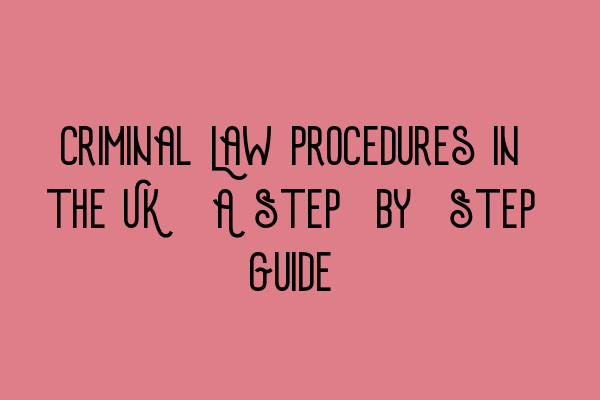Criminal Law Procedures in the UK: A Step-by-Step Guide
Welcome to SQE Criminal Law & Practice Law UK! In this comprehensive guide, we will take you through the
step-by-step procedures of criminal law in the UK. Whether you are a law student or a practitioner, this guide
will provide you with an in-depth understanding of the legal processes involved in criminal cases.
1. Investigation
The criminal law process begins with an investigation. Law enforcement agencies such as the police gather
evidence, interview witnesses, and collect information to determine if a crime has been committed. During this
stage, it is crucial to adhere to proper procedure to ensure fair treatment of the accused.
2. Arrest and Custody
If the police have reasonable grounds to believe that a person has committed a crime, they may proceed with an
arrest. The arrested person is then taken into custody, where they will be informed of their rights and the
reason for their arrest.
3. Charges
After arrest, the Crown Prosecution Service (CPS) reviews the evidence collected during the investigation and
decides whether to press charges. If charges are filed, the accused will be formally informed of the nature of
the charges against them.
4. Bail Hearing
Once charged, the accused may be held in custody or released on bail. A bail hearing is conducted to determine
whether the accused is eligible for release before the trial. Factors such as the seriousness of the crime,
flight risk, and public safety are considered in this process.
5. Plea
During the plea stage, the accused can choose to plead guilty or not guilty. If a guilty plea is entered, the
case may proceed to sentencing. If a not guilty plea is entered, the case will progress to a trial.
6. Pre-Trial Proceedings
Before the trial begins, various pre-trial proceedings may take place. This includes case management hearings,
disclosure of evidence, witness statements, and legal arguments. These proceedings aim to streamline the trial
and ensure that all relevant information is available to both the prosecution and the defense.
7. Trial
The trial is the central stage of the criminal law process. The prosecution presents evidence and witnesses to
prove the guilt of the accused, while the defense challenges the evidence and presents their own case. Trials
can be held in either magistrates’ courts or crown courts, depending on the seriousness of the crime.
8. Sentencing
If the accused is found guilty or pleads guilty, the judge will proceed to sentencing. Sentences can range from
fines and community service to imprisonment, depending on the severity of the offense and other relevant
factors.
9. Appeals
If the accused is dissatisfied with the outcome of the trial or the sentence imposed, they have the right to
appeal. Appeals are heard by higher courts, where legal arguments are made to challenge the decision or seek a
more favorable outcome.
Conclusion
Criminal law procedures in the UK are complex and require a thorough understanding of the legal framework.
Whether you are a law student preparing for SQE exams or a legal practitioner, it is essential to be well-versed
in these procedures to ensure your success in the field. For additional resources and exam preparation guides,
check out our related articles:
- SQE 1 Practice Exam Questions
- SQE 1 Practice Mocks FLK1 FLK2
- SQE 2 Preparation Courses
- SQE 1 Preparation Courses
- SRA SQE Exam Dates
We hope this guide has provided valuable insights into the criminal law procedures in the UK. For any legal
assistance or further inquiries, do not hesitate to contact SQE Criminal Law & Practice Law UK.
